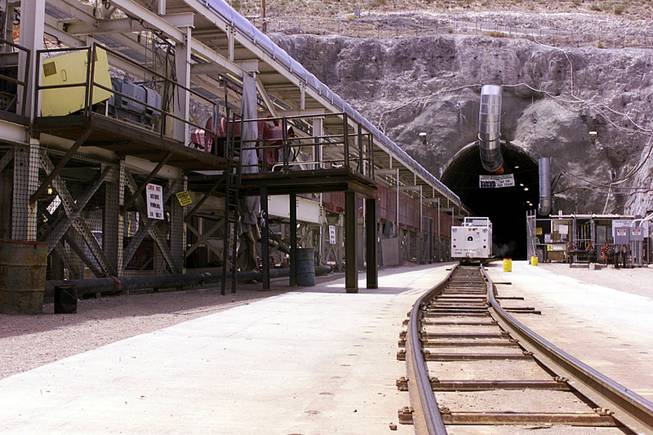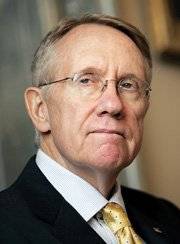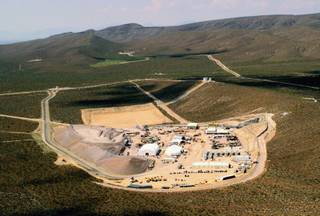
Steve Marcus / FILE
The Obama administration promised Monday it would withdraw the application to open a nuclear waste repository at Yucca Mountain.
Sunday, Feb. 7, 2010 | 2 a.m.

Harry Reid
Sun coverage
Related stories
- Feds file request for suspension of Yucca Mountain license (2-1-2010)
- Obama to zero out Yucca Mountain funding, pull license (1-31-2010)
- Dying Yucca Mountain still has some life (1-30-2010)
- Obama administration: ‘We’re done with Yucca’ (1-29-2010)
- Friday announcement will unveil plans for panel on Yucca alternatives (1-28-2010)
- White House, Energy Department clash over Yucca Mountain cuts (1-14-2010)
- Report: Yucca Mountain costs double other alternatives (12-2-2009)
- Nuclear industry weighs in on nuke dump license (11-16-2009)
- In Nevada, nuclear raises touchy issues (11-14-2009)
- Feds to slash Yucca funds as project maintains life (11-9-2009
- 3 Las Vegans join state Commission on Nuclear Projects (11-5-2009)
Yucca Mountain
After all the years spent fighting the proposed Yucca Mountain nuclear waste repository, a phone call on a Wednesday in July between the Senate majority leader and the new energy secretary turned the tide.
The Senate was facing a late-night vote on the Energy Department’s 2010 spending plan, and Harry Reid, the Democratic leader, had the backing of his colleagues to slash funding for the Nuclear Regulatory Commission’s review of a license for the nuclear waste dump.
Reid picked up the phone and got Energy Secretary Steven Chu on the line.
Although President Barack Obama was no friend of Yucca Mountain, Chu was intrigued by the scientific lessons that could be learned studying the nation’s 25-year attempt to build a nuclear waste repository in the Nevada desert. Chu, a Nobel laureate, had said repeatedly since joining Obama’s Cabinet that although Yucca Mountain was no longer an option, he saw value in pressing on with its license application before the commission — a prospect that sent shudders through Nevada’s anti-dump contingency.
Reid had other plans. He believed the licensing process had to end and wanted to pare Obama’s budget for that review.
The conversation between Reid and Chu was brief, as they often are with the majority leader. When the call ended, Reid told his staff what had transpired.
“Chu’s on board to zero out Yucca,” he said, referring to the coming year’s budget.
From that moment on, the cards were stacked against a dump at Yucca: no money, no project.
Much later, Chu’s office would say it came to understand that pursuing a license for the sake of science wouldn’t be worth the cost.
Like so many decisions in Washington, the one made last week to pull the plug on Yucca Mountain’s license application was the product of painstaking deal-making, crafted with carrots and sticks needed for compromise.
It was forged in part by political pressures — a new president keeping his vow to a state that helped elect him, while boosting a chief ally, the majority leader, who faces a difficult re-election race.
The decision also highlights Obama’s pragmatic streak as he forced the powerful nuclear industry to accept demise of a dump at Yucca while also handing out major sweeteners to the industry, a key ally.
As the Obama administration unveiled plans for Yucca last week, it also announced $36 billion in new federal loan guarantees for construction of nuclear plants. Moreover, the industry was given a seat on the administration’s new commission that will spend 18 months studying alternatives.
Kevin Kamps, a longtime anti-nuclear watchdog at Beyond Nuclear, said the exchange was a reminder that “the nuclear power industry is one of the most powerful players in Washington.”
“In my mind, that’s kind of a trade-off: The Obama administration is following through on its promise to Nevada on Yucca while giving this windfall to the nuclear industry,” Kamps said.
•••
When Chu first began expressing desire to keep the Yucca license intact, his comments were considered missteps by a politically naive professor-turned Washington player — a new Cabinet secretary not adhering to the talking points.
But Chu’s belief there was value in pursuing a license for a Yucca repository appeared deeply felt.
“Even as we bring an orderly end to the Yucca Mountain project, the department believes that the license application process can offer useful guidance on how the NRC will approach future applications that could help us toward securing alternatives to Yucca Mountain,” Chu said in a May statement as the president unveiled his first budget.
That worried Yucca Mountain’s foes, particularly staff at Nevada’s Agency for Nuclear Projects, which had fought the dump for decades. If the license were allowed to proceed, a new administration, perhaps without Reid as majority leader, could revive the project.
Chu’s task was complicated by the fact that the government, by law, is responsible for the waste under a deal reached with industry in 1982. Companies have been successfully suing the federal government for failing to open Yucca Mountain, and killing the project could cost billions more.
Meanwhile, the nuclear industry needed to reassure investors that the death of a Yucca dump would not impede the construction of nuclear plants or reverse the government’s commitment to take nuclear waste off the industry’s hands.
But waste was only part of the industry’s problem. New plants are expensive, costing as much as $10 billion each, and the industry needed money to finance construction at a time when Wall Street credit had dried up.
Federal loan guarantees for nuclear plant construction had been a topic of conversation between the industry and Obama long before he became president. During the presidential campaign, the Nuclear Energy Institute, the industry’s main lobby, brought candidate Obama its wish list.
“Industry was well engaged with the administration on loan guarantees,” institute spokesman John Keeley said.
Obama, from Illinois, is in favor of nuclear power. Unlike Nevada, Illinois is home to nuclear power plants and has more waste stored at plants than any other state.
Obama’s first budget, presented in 2009, was a lesson in compromise. He slashed Yucca Mountain’s budget, allowed the licensing process to continue and called for a national panel to study alternatives.
It didn’t take the dramatic steps some had expected, but pro- and anti-Yucca forces seemed satisfied.
Reid initially accepted the administration’s path, deferring to the Nobel-winning energy secretary’s pursuit of scientific inquiry. But Reid quickly understood that route was not good enough for Nevada and the license must be pulled to guarantee the project’s demise.
Reid pushed to end the project and ensure Allison Macfarlane, a George Mason University professor who has conducted extensive nuclear waste research, was appointed to the panel studying alternatives. Macfarlane is a respected expert who has raised crucial questions about the storage of nuclear waste at Yucca Mountain.
These decisions combined to create a Washington chess game — each side finding ways to advance its goals as the other positioned itself.
Reid wasn’t involved in the loan guarantees for the industry. He has the needed leverage. If the industry hopes to win congressional approval for the beefed-up loan package in Obama’s budget, it will need to go through the majority leader.
Reid is not opposed to incentives for nuclear power “if they’re provided in the context of significant progress on national renewable energy development and part of a compromise clean energy and climate bill that creates jobs and makes us more energy independent,” his spokesman said.
•••
After Reid secured Chu’s commitment to kill Yucca’s budget, his staff asked whether the White House was also onboard.
Reid sealed the deal with Obama’s senior advisers. The next day, the senator’s office issue a news release stating that Obama would zero out dump development funding in 2011.
When the president unveiled his proposed 2011 budget last week, Yucca’s funding had been eliminated and the administration would “take steps” to withdraw the license. Again, the president had made a pragmatic decision to please all sides: Yucca’s license would be pulled but the industry’s loan guarantees, with the addition of $36 billion, would triple.
The energy secretary played his role by announcing simultaneously that the license application would be withdrawn within 30 days, sooner than some had expected.
Chu, who had balked in December at having the project’s budget eliminated, succeeded in shifting as much as $55 million to another Energy Department office so he could close the Yucca project in an orderly way that preserves the scientific research.
As for Chu’s earlier intent to allow the repository process to play out? A spokeswoman said Friday the department decided it was not worth it.
“During the budget process, the department concluded that any information gained from continuing the license application would not outweigh the cost,” spokeswoman Stephanie Mueller said.
“We have begun the process of withdrawing the application to focus our resources on closing down the Yucca site and charting a new path forward through the blue-ribbon commission.”


Join the Discussion:
Check this out for a full explanation of our conversion to the LiveFyre commenting system and instructions on how to sign up for an account.
Full comments policy